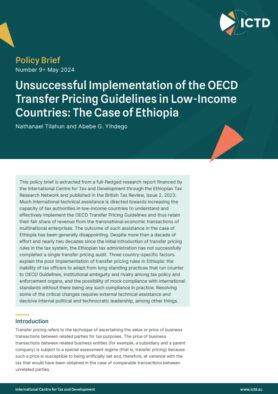Policy Brief 9
This policy brief is extracted from a full-fledged research report financed by the International Centre for Tax and Development through the Ethiopian Tax Research Network and published in the British Tax Review, Issue 2, 2023.
Much international technical assistance is directed towards increasing the capacity of tax authorities in low-income countries to understand and effectively implement the OECD Transfer Pricing Guidelines and thus retain their fair share of revenue from the transnational economic transactions of multinational enterprises. The outcome of such assistance in the case of Ethiopia has been generally disappointing. Despite more than a decade of effort and nearly two decades since the initial introduction of transfer pricing rules in the tax system, the Ethiopian tax administration has not successfully completed a single transfer pricing audit. Three country-specific factors explain the poor implementation of transfer pricing rules in Ethiopia: the inability of tax officers to adapt from long-standing practices that run counter to OECD Guidelines, institutional ambiguity and rivalry among tax policy and enforcement organs, and the possibility of mock compliance with international standards without there being any such compliance in practice. Resolving some of the critical changes requires external technical assistance and decisive internal political and technocratic leadership, among other things.

